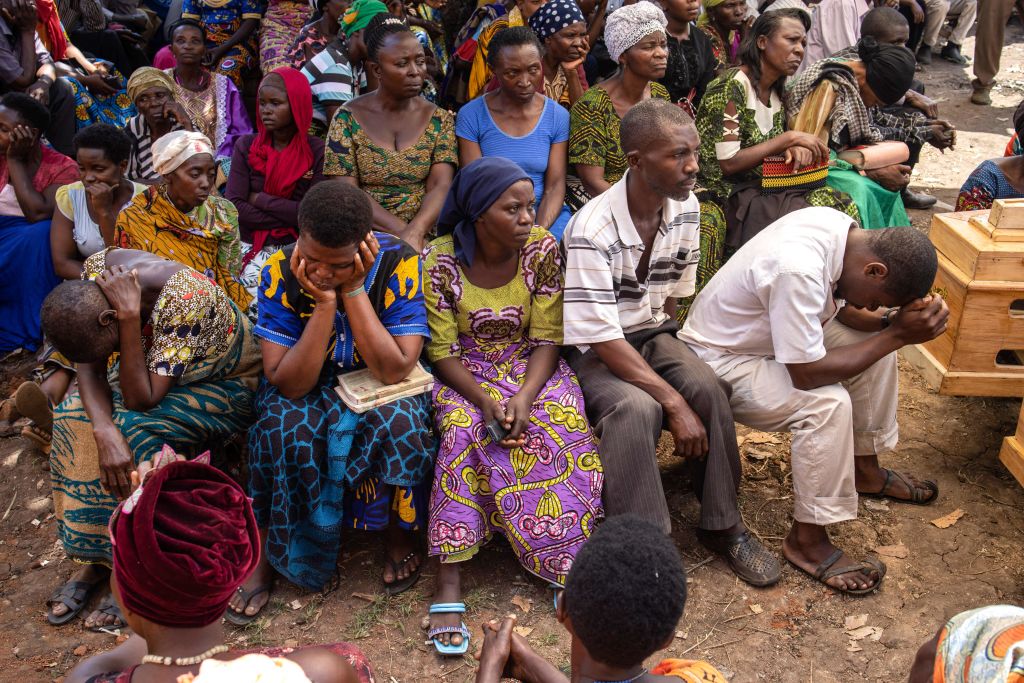ADF STAFF
It was about 10 p.m., and children were singing gospel songs at the Mpondwe Lhubiriha Secondary School, near Uganda’s border with the Democratic Republic of the Congo (DRC).
In an instant, Mary Masika said the singing became wails of anguish and terror. As gunfire erupted, she heard a person ordered to throw a bomb into a school dormitory.
“Then I heard a student crying and another one saying, ‘Jesus, help me, they’re killing me,’” Masika told the BBC.
The mid-June attack committed by the Allied Democratic Forces killed 42 people, including 37 students, who were hacked with machetes, shot or burned to death. Six students were abducted.
“From the time of this incident I am very scared,” Masika said. “I keep on hearing voices of those students begging for their lives.”
Among those killed were Elphanas Mbusa, 47, a security guard who tried to intervene, and his 17-year-old son, Masereka Elton. Mbusa’s other son was missing. It was not clear if he was abducted or if his body was too badly burned to be identified.
Mbusa’s father, Hurubana Kimadi Onesmus, told the BBC that he could not understand how the attackers were able to infiltrate the school.
“There’s a heavy military presence in the area,” he said.
Within days, police arrested 20 suspected Allied Democratic Forces members in connection with the attack. Since the 2010s, all attacks in Uganda have been attributed to the group, according to The Africa Report.
The group, which has ties to the Islamic State group (IS), is largely funded through illegal mining and logging operations, and kidnappings for ransom. Analysts say it also receives considerable funding from the IS.
The school massacre is a trend among rebel groups linked to the IS in Africa, most notably by Boko Haram in Nigeria, where schools have been targeted for years. Boko Haram translates as “Western education is forbidden.”
In 2021, more than 300 schoolgirls were kidnapped by gunmen from a government school in northwestern Zamfara State. More recently, rebels kidnapped eight secondary school students in northern Kaduna State in April.
Boko Haram likely will continue to target schools because such attacks generate publicity, weaken state security forces and secure funding through ransoms, Nigerian journalist Philip Obaji Jr. wrote in Foreign Policy.
The Allied Democratic Forces originally was based in western Uganda but has expended its operations to battle-scarred eastern DRC, where it has killed 5,000 people since 2013, according to a recent study conducted by the Program on Extremism at George Washington University.
In March, suspected Allied Democratic Forces fighters killed at least 36 people during an overnight attack in the village of Mukondi in eastern DRC’s North Kivu province. As in the Ugandan school attack, the rebels mainly killed victims with machetes.
They also burned down the entire village, Carly Nzanzu Kasivita, the provincial governor, said on Twitter.
According to Pierre Boisselet, coordinator of research on violence at Ebuteli, a research organization based in Kinshasa, the group is known to takes sides in intercommunity tensions. This allows it to benefit from
illicit mining and logging operations, and control land and trade routes in protected areas.
The group has persisted despite efforts by the Ugandan Army, Congolese Army and United Nations peacekeepers since 1999.
“What strikes me is that they manage to use their knowledge of the area to hide and bounce back every time,” Boisselet told The Africa Report.
The latest Ugandan and Congolese joint military operation, launched in late 2021, has failed to contain the group’s threat as it continues to expand its operations west and to the northeast.
Security analyst Solomon Asiimwe of Uganda’s Nkumba University says the Ugandan government should explore other ways to neutralize the group.
“Terrorism cannot be defeated just through only military,” Asiimwe told Voice of America.
The group’s former leader, Jamil Mukulu, is in prison, “but [the Allied Democratic Forces] has not stopped,” Asiimwe added. “Maybe it’s high time [the] government also finds a way of talking to [the Allied Democratic Forces].”
Boisselet also believes that military interventions are not enough to eradicate the group.
“More effort needs to be put in helping the Congolese state build the capacity to dismantle those networks and that can only be done with better intelligence services,
identifying sponsors and allies, and having a justice system capable of dealing with it,” Boisselet told The Africa Report.

